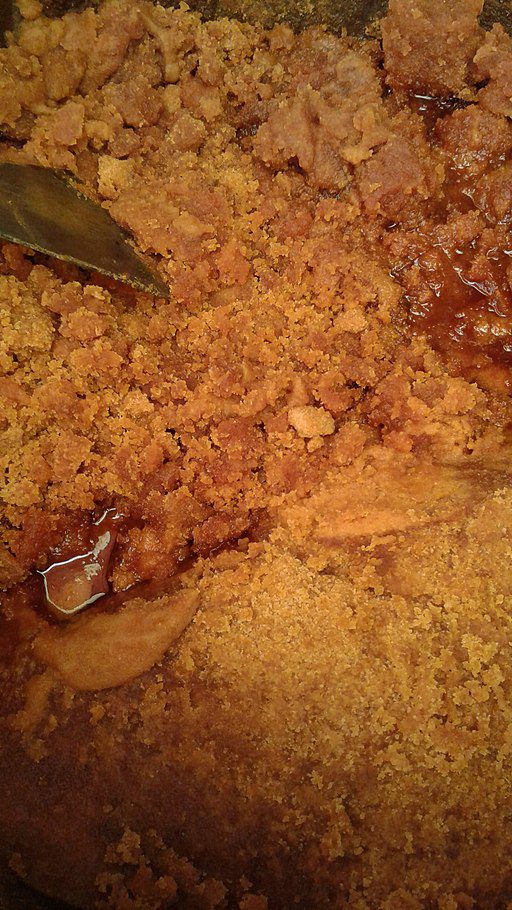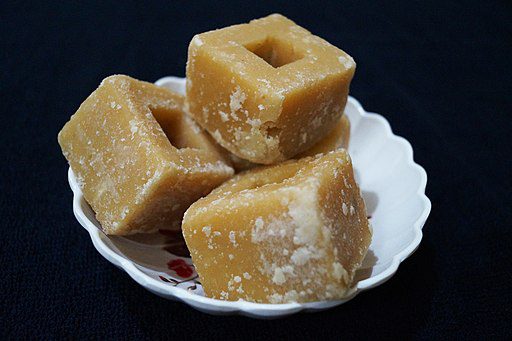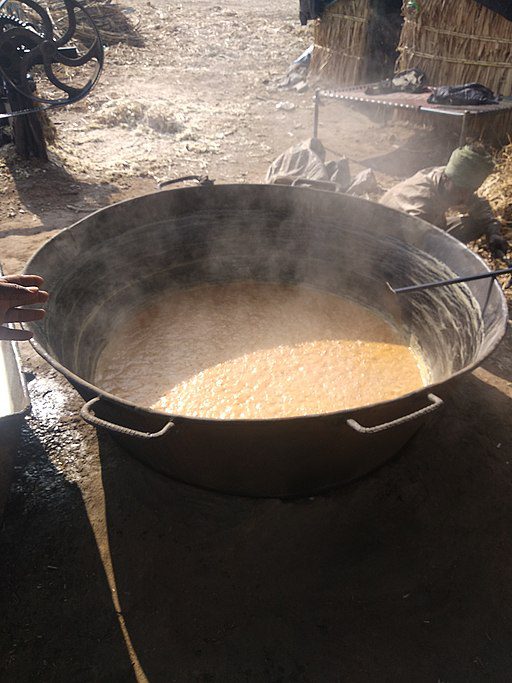Easily one of the more preferred sweeteners in Indian food, the indigenous advantages of eating jaggery come with a whole host of health benefits, apart from being rather delicious. And it’s used in multiple food items in India, be it in desserts or even curries. For instance, in south India, many prefer to drink their filter coffee with jaggery. The added flavor can do wonders for the hot beverage.
And most of us don’t need to be introduced to the gur ka halwa, gur ki roti, til ke laddu or gulgule, which are all famous sweet delicacies. Jaggery has been used in Ayurvedic medicines for ages. Being rich in essential nutrients, it is often referred to as the ‘medicinal sugar’. Let’s take a look at the health benefits of this sweet natural product.
Table of Contents
What Is Jaggery?
Jaggery is unrefined sugar obtained by boiling raw and concentrated sugarcane juice without adding any chemicals in it. It has traces of iron, minerals, fiber, and salt and can be golden brown to dark brown in color. Not just sugarcane, jaggery is also obtained from date palm (nolen gur or patali gur), coconut palm, and sago palm, But it’s the version made from sugarcane that is more common and widely available.

image credit: Wikiimedia Commons
| Nutritional Value Of Jaggery | 100 Grams |
| Calories | 383 |
| Sucrose | 65-85 grams |
| Fructose and Glucose | 10-15 grams |
| Protein | 0.4 grams |
| Fat | 0.1 grams |
| Iron | 11 mg |
| Magnesium | 70-90 mg |
| Potassium | 1050 mg |
| Manganese | 0.2 -0.5 mg |
Benefits Of Eating Jaggery – A Healthy Sugar Alternative
1. An Excellent Source Of Energy
Have you ever wondered why sugary items give you instant energy but also give you hunger pangs after a short period of time?
Being a simple carbohydrate, refined sugar absorbs easily but can’t satiate you for too long. On the other hand, jaggery is a complex carbohydrate that provides you with energy gradually but over a longer period of time. Furthermore, eating jaggery doesn’t spike blood sugar levels drastically like refined sugar, which also makes it a good option for those with diabetes.
2. Promotes Digestion
If you’ve ever spotted someone eating a piece of jaggery after their meals, and especially during the winters, don’t be too surprised. Jaggery is often considered to aid in digestion as it activates the digestive enzymes in one’s body. It stimulates movement in the intestines and thus combats constipation. Even though there is not enough research to prove that jaggery promotes digestion, it’s still a much better option than to pop sweet treats made with refined sugar after a meal.
3. Can Prevent Anemia
Jaggery is a good source of iron as 100 grams of it contains 11 mg of iron which is 61% of the RDI but it will take a really long time to consume that quantity of jaggery. Generally, we eat a small piece or about 1 teaspoon of jaggery if it’s in powdered form, and cannot rely on it for fulfilling the iron requirement of the body. However, if it’s eaten along with other iron-rich food, it adds that much more benefit to the body.
4. May Relieve Cold And Cough
Being warm in nature, jaggery can soothe the symptoms of a common cough and cold. Furthermore, jaggery is a good source of zinc and vitamin C that helps in the curing of the flu. You can drink some warm water or tea with a bit of jaggery to protect yourself from common illnesses.

Image credit: Wikimedia Commons
5. Helps In Liver Detoxification
The benefits of eating jaggery help to flush out toxins from the liver and make it clean and healthy so we can help our liver by eating a small amount of it every day.
6. Works As A Blood Purifier
Jaggery has plenty of iron that improves the hemoglobin levels in the body. Additionally, iron removes any clotting in the blood and purifies it.
7. Strengthens The Immune Power
The zinc in jaggery can stimulate our immunity. Zinc supports the immune system and fights off viruses or bacteria. Jaggery also has selenium which helps in reducing the oxidative stress of the body. As a result, our body gets good resistance against diseases and protection from free radicals.
8. May Ease Menstrual Pain
Jaggery is enriched with vital nutrients and it secretes endorphins which provide the feeling of relaxation and calmness and can be quite beneficial if you go through cramps, abdominal pain, and a feeling of lowness during your menstruation.

9. Improves Intestinal Health
Jaggery is rich in magnesium – it contains 16 mg in 100 grams – and fulfills 4% of the Reference Daily Intake. Magnesium is beneficial in relaxing the muscles of the intestines that further ensure the smoother flow of passing stools thus makes intestines healthy and strong.
10. May Maintain Blood Pressure
High blood pressure can lead to several damaging health problems. Being rich in potassium and sodium, one of the benefits of eating Jaggery is that it helps to maintain acid levels, fluid balance, and muscle contraction of the body. Additionally, it reduces water retention, which helps to control the blood pressure in the body.

11. Helps In Weight Loss
Jaggery is high in potassium that maintains the electrolyte balance and lowers water retention in the body. Moreover, it’s beneficial in boosting metabolism and lean muscles.
Also Read: We Reviewed Whole Foods Bajra Jaggery Cookies. Check It Out.
12. Aids Respiratory Health
The regular consumption of jaggery promotes respiratory health and may prevent problems such as bronchitis and asthma. Jaggery contains anti-allergic properties that protect the lungs from allergens. It relaxes the bronchial muscles and makes breathing easy in case of asthma. Furthermore, the iron present in jaggery improves blood circulation.
13. Eating Jaggery Promotes in Healthy Skin
Did you know that jaggery contains gycolic acid, an alpha hydroxyl acid that benefits the skin in many ways? It’s very effective for curbing aging signs such as fine lines, wrinkles, age spots, uneven skin, and acne scars. Additionally, jaggery has selenium that helps in fighting free radicals and prevents oxidative stress, making your skin look younger in the process. But again, eat it in small quantities.

14. Provides Lustrous Hair
Apart from boosting health and giving your skin a reason to be grateful, jaggery can do wonders for your hair as well. It is rich in iron and vitamin C which is helpful in maintaining hair health and improving growth.
The Many Uses Of Jaggery
Apart from the fabulous benefits of eating jaggery, it is also an amazing alternative to refined sugar and is used for making beverages, desserts, sweets, and whatnot. Dishes such as halwas, cake, chakkara Pongal, kheer, become even tastier when it’s made with jaggery and are enjoyed especially during winter. Incidentally, jaggery is also used for dyeing fabric.
Also Read: Mishry Reviews: Gouri’s Natural Energy Bars- Palm Jaggery And Honey
How To Choose The Right Jaggery
Given that we are constantly battling with adulteration in our foods, know this. Despite its unrefined appearance, it’s important to check jaggery for purity. Pure jaggery is dark brown and should not contain any specks of any other color. Always taste before buying unpacked jaggery. If you taste a bit of salt in it, that jaggery block might not be fresh. If there’s a hint of bitterness, you’ll know that the jaggery has gone through the process of caramelization during its making. Avoid jaggery that looks too yellow. If you notice crystals on the jaggery, it indicates that it has undergone artificial processing.

Image credit: Wikimedia Commons
Is Jaggery Healthier Than Sugar? Benefits of Eating Jaggery
The trend of replacing white sugar with jaggery is gaining popularity, but it still contains sugars and calories. It’s definitely healthier than refined sugar and comes with a fair bit of nutritional value but one needs to eat a lot of jaggery in order to harness its benefits, and that is not really recommended.
Also Read: Urban Platter Jaggery Chana By Mishry Reviews
Watch Out For The Side Effects Of Eating Jaggery
- As it is with any food – natural or processed – moderation is key. Even though it’s naturally obtained, jaggery still does contain sugar and therefore can cause heart diseases, obesity, and type 2 diabetes if taken in large quantities. If you are already battling with these issues, talk to your doctor before eating it.
- Jaggery should be avoided during the summer months because of its warming properties. It can heat the body up and lead to stomach problems.
Conclusion
Jaggery is raw and unrefined sugar, which contains a good amount of vitamins and minerals. It’s an amazing alternative for white sugar which is nothing more than empty calories.
It’s a great choice to replace sugar with jaggery but the addition of jaggery in the diet is not advised due to the calories in jaggery. Basically, do not overdo it.
You can use a little amount of jaggery for cough and cold, smooth digestion, and other health benefits but moderation is the key. It’s good for health and should be eaten for plenty of jaggery benefits.
Is eating jaggery during summers good for health?
You can have jaggery with cold water in the form of a sharbat to maintain body temperature but it’s not recommended to exceed the intake as it may cause nose bleeding and other problems.
What’s the best time to eat jaggery?
The best time to eat jaggery is after finishing a meal. It’s said to promote digestion and stimulate bowel movement. Furthermore, Jaggery can also prevent constipation.
Can babies eat jaggery?
It’s not suggested to give jaggery to babies till they are one year old as any form of sugar is prohibited during this period. Always consult your doctor before introducing any kind of sweets to babies, even if it’s the healthy jaggery.
How much jaggery can I eat in a day?
Being high in calories contains 4 kcal/grams, it’s advised to eat jaggery in moderation. One can eat about 10 to 15 grams of jaggery every day, and not more than 25 grams even if you are healthy and do not have diabetes.


